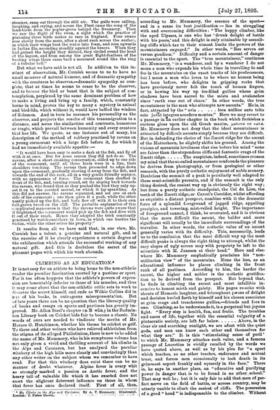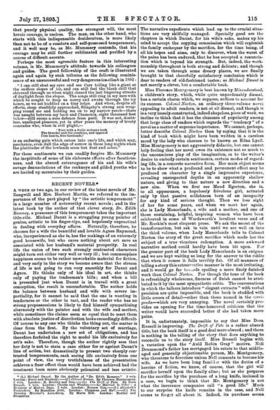CLIMBING AS AN EDUCATION.*
IT is not easy for an athlete to bring home to the non-athletic reader the peculiar fascination exerted by a pastime or sport. For it too often happens that the athlete's powers of expres- sion are lamentably inferior to those of his muscles, and thus it may come about that the non-athletic critic sets to work to di-cover the secret himself, and ends, as Wilkie Collins did in o is of his books, in outrageous misrepresentation. But of late years there can be no question that the literary quality of books and essays on sports and pastimes has greatly im- proved. Mr. Allan Steel's chapter cn B wling in the Badmin- ton Library book on Cricket bids fair to become a classic. No words of ours are needed to vindicate the merits of Mr. Horace G. Hutchinson, whether his theme be cricket or golf. To these and other writers who have relieved athleticism from the stigma of its alleged Philistinism, there is now to be added the name of Mr. Mummery, who in his sumptuous volume has not only given a vivid and thrilling account of his climbs in the Alps and Caucasus, but has analysed the peculiar witchery of the high hills more clearly and convincingly than any other writer on the subject whom we remember to have read. For that this witchery does exist there can be no manner of doubt whatever. Alpine fever is every whit as strongly marked a passion as Arctic fever, and the heavy toll of valuable life which it has exacted does not exert the slightest deterrent influence on those in whom that fever has once declared itself. First of all, then, • My Climbs in the .stYps ani Caucasus. By A. P. Mummery. Illustrated. London: T. Fisher Unwin. -1 • LL: r-::
according to Mr. Mummery, the essence of the sport— and in a sense its best justification — lies in struggling with and overcoming difficulties : " The happy climber, like the aged Ulysses, is one who has ' drunk delight of battle with his peers,' and this delight is only attainable by assault- ing cliffs which tax to their utmost limits the powers of the mountaineers engaged." In other words, " Res severs est verum gaudium." Difficulty and a certain amount of danger is essential to the sport. The "true mountaineer," continues Mr. Mummery, " is a wanderer, and by a wanderer I do not mean a man who expends his whole time in travelling to and fro in the mountains on the exact tracks of his predecessors, but I mean a man who loves to be where no human being has been before, who delights in gripping rocks that have previously never felt the touch of human fingers, or in hewing his way up ice-filled gullies whose grim shadows have been sacred to the mists and avalanches since earth rose out of chaos.' In other words, the true mountaineer is the man who attempts new ascents." He is, in fact, attracted by the " avia . . . . . loca nullins ante trita solo juvat allegros accedere montes." Here we may revert to a passage in an earlier chapter in the book which furnishes a curious gloss upon the old Greek maxim, X&X£174:e rei
Mr. Mummery does not deny that the ideal mountaineer is attracted by difficult ascents simply because they are difficult. But in defending the choice of the Zmutt ridge for the ascent of the Matterhorn, he slightly shifts his ground. Among the visions of mountain loveliness that rise before his mind " none are fairer than the stupendous cliffs and fantastic crags of the Z mutt ridge The suspicion, indeed, sometimes crosses my mind that the so-called mountaineer confounds the pleasure he derives from photography, or from geological or other research, with the purely msthetic enjoyment of noble scenery. Doubtless the summit of a peak is peculiarly well adapted to these semi-scientific pursuits, and if the summit is the only thing desired, the easiest way up is obviously the right way; but from a purely msthetic standpoint, the Col da Lion, the teeth of the Z mutt ridge, or Carrel's Corridor, whilst affording as exquisite a distant prospect, combine with it the dramatic force of a splendid foreground of jagged ridge, appalling precipice, and towering, mist-veiled height. The importance of foreground cannot, I think, be overrated, and it is obvious that the more difficult the ascent, the bolder and more significant will usually be the immediate surroundings of the traveller. In other words, the msthetic value of an ascent generally varies with its difficulty. This, necessarily, leads us to the conclusion that the most difficult way up the most difficult peaks is always the right thing to attempt, whilst the easy slopes of ugly screes may with propriety be left to the scientists with M. Janssen at their head." Here and else- where Mr. Mummery emphatically proclaims his "non- utilitarian view " of the mountains. None the less, as an educational influence he places climbing in the front rank of all pastimes. According to him, the harder the ascent, the higher and nobler is the aesthetic gratifica- tion to be derived from the prospect. But beyond that, he finds in climbing the surest and most infallible in- centive to honest mirth and gaiety. His pages re-echo with shouts of Homeric laughter, and triumphant Paeans of delight and derision hurled forth by himself and his chosen associates at grim crags and treacherous gullies,—friends and foes in one. Climbing, as he understands it, is a perpetual but joyous fight. "Every step is health, fun, and frolic. The troubles and cares of life, together with the essential vulgarity of a plutocratic society, are left far below Above, in the clear air and searching sunlight, we are afoot with the quiet gods, and men can know each other and themselves for what they are." It is this "stimulating sense of peril' to which Mr. Mummery attaches such value, and a famous passage of Lucretius is vividly recalled by the words we have quoted above, as well as by his plea for "a sport which teaches, as no other teaches, endurance and mutual trust, and forces men occasionally to look death in its grimmest aspect frankly and squarely in the face." There is, he says in another place, an "educative and purifying power in danger that is to be found in no other school." That may well be; but it is only fair to add that men of per- fect nerve on the field of battle, or across country, may be utterly unable to climb the easiest of cliffs. The possession of a good " head " is indispensable to the climber. Without
that purely physical quality, the strongest will, the most heroic courage, is useless. The man, on the other hand, who starts with this indispensable desideratum, is more likely than not to be of a resolute and self-possessed temperament, and it well may be, as Mr. Mummery contends, that his courage may be still further sublimated and purified by a course of difficult ascents.
Perhaps the most agreeable feature in this interesting volume, is Mr. Mummery's attitude towards his colleagues and guides. The good fellowship of the craft is illustrated
again and again by such tributes as the following reminis- cence of an unsuccessful and very dangerous ice-climb in 1892 : " I can still shut my eyes and see Carr toiling like a giant at the endless slopes of ice, and can still feel the blank chill that shivered through us when night chased the last lingering streaks of daylight from the slopes. The songs still ring in my ears with which he sought to keep us merry and awake through the icy hours, as we sat huddled on a tiny ledge. And when, despite all efforts, sleep stealthily approached, Slingsby's strong arm wrap- ping round me and holding me on to my narrow perch—there was naught between my back and Chamonix, eight thousand feet below—still seems a sure defence from peril. It was not, doubt- less, unalloyed pleasure, yet in after years the memory of trusty comrades who, when in evil plight,- . Ever with a frolic welcome took The thunder and the sunshine, and oppossd Free hearts, free foreheads,
is an enduring gain which enters into one's life, and which may, perchance, even dull the edge of sorrow in those long nights when the platitudes of the lowlands seem but dust and ashes."
For these sentiments we can readily forgive Mr. Mummery the ineptitude of some of his elaborate efforts after facetious. ness, and the absurd extravagance of his and his wife's savage denunciations of the cockneys and gilded youths who are hauled up mountains by their guides.



































 Previous page
Previous page